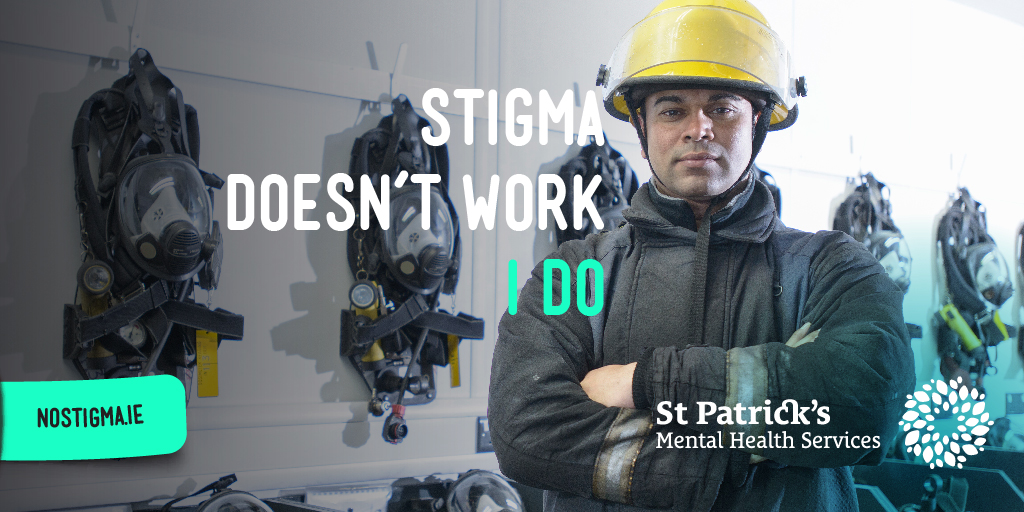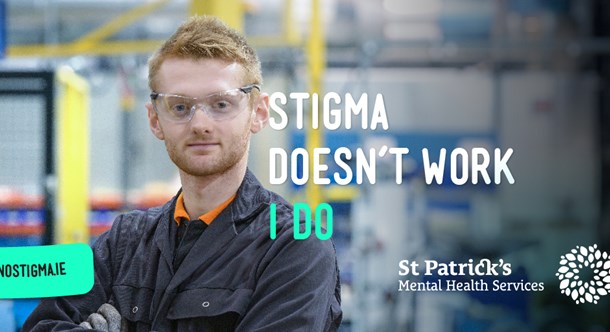
As part of our #NoStigma campaign in St Patrick’s Mental Health Services (SPMHS), we are launching a new suite of resources relating to mental health difficulties in the workplace.
The new resources include:
- A short video explaining people’s rights in relation to their mental health and the workplace
- A blog exploring how we can achieve a life without stigma in the workplace
- An information booklet covering mental health and workplace rights, guidance for returning to work after a mental health difficulty, and supports for both employees and employers.
The information booklet includes contributions from a number of employee and employer support organisations, including the National Learning Network, Employability South Dublin and Employers for Change - the Open Doors Initiative.
In addition, we held a free webinar, #NoStigma in the Workplace, on Thursday, 23 March, which included speakers with lived experiences of mental health difficulties and representatives from EmployAbility, the Open Doors Initiative and the Rehab Group.
Together, these new resources are intended to explore how to support people with mental health difficulties in the workplace, to highlight the rights of employees who are experiencing mental ill-health, and to outline the role of their employers.
Dealing with mental health discrimination at work
This launch marks the latest phase of our #NoStigma campaign. Since 2020, the campaign has been working to reframe mental health stigma and discrimination by showing the positive effect on life when these are not experienced. #NoStigma explores how it serves us all collectively when we can live free from mental health stigma in the home, the community and in the workplace.
The resources are informed by findings from our most recent annual stigma survey, which revealed that 22% of people in Ireland have experienced discrimination at work due to a mental health difficulty.
The findings indicate that mental health stigma can be a barrier in the workplace. For instance, over the last few years, there has been a decrease in the number of people who would be okay explaining to their boss that they needed time off due to a mental health difficulty. In 2019, 61% of people said that they would be okay asking for time off for a mental health difficulty, but this dropped to 56% in 2022.
Equally, the survey shows a need to raise awareness of mental health supports in the workplace. For example, 55% of respondents were not aware that people with mental health difficulties have the right to reasonable accommodations in the workplace. Reasonable accommodations include access to support for time off and a change in work responsibilities.
Progressing towards positive change
However, the survey results also revealed that positive attitudes to mental health in the workplace are improving in some instances, which reinforces the opportunity for change.
believe that someone who experiences panic attacks could work as head of a large company
believe that workplaces in Ireland are open to employing people with mental health difficulties
have had positive experiences of disclosing mental health difficulties at work
Exploring personal experience
Speaking about his experience of mental health and work, Gary Kiernan, social worker and Chair of our Service User and Supporters Council, says:
“After experiencing depression for a number of years, I began to realise that I had self-stigmatising attitudes towards my own mental health, which were acting as a barrier to me seeking the supports I required both in my personal life and in the workplace. It was only when I accepted my own mental health did I become more aware of the effects of stigma and how it can act as a barrier.”
“We talk a lot about mental health, but we need to ensure that these conversations translate to tangible actions to tackle stigma. By having open and honest conversations about our mental health, particularly being honest about the supports we require, whether that’s in the home, workplace or the community, we can break down the stigma and begin on the road to recovery."
He continues:
"Our working lives make up a huge part of our daily lives, and being supported and accommodated for in the workplace makes a significant difference to our experiences of mental health and our attitudes towards it. The launch of these resources from SPMHS as part of their #NoStigma campaign is a much welcomed and important step towards creating more inclusive and accepting working environments.”
“Much progress has been made in recent years to improve how mental health is understood and approached in the workplace; however, there is still work to be done in raising awareness of what people’s rights are when it comes to their mental health and work, and what supports they are entitled to. The focus of the #NoStigma campaign this year is to empower people with knowledge about their rights and entitlements, and to demonstrate what a workplace without mental health stigma looks like.
"Workplaces without stigma are inclusive and supportive environments where those experiencing mental health difficulties have access to equal opportunities for employment and progressing at work, as well as having access to available supports in the workplace if required".
Promoting positive mental health awareness in the workplace
Speaking about the importance of promoting a life without stigma in the workplace, Paul Gilligan, our Chief Executive Officer, says:
“Research has shown that work can play a significant role in the life of a person experiencing mental health difficulties – it fosters a sense of pride and self-esteem, provides a helpful sense of routine, and offers a sense of personal meaning, which can enhance a person’s recovery journey.”
“The stigma surrounding mental health difficulties at work has been recognised by the World Health Organisation as a barrier to disclosure at work and to the implementation, and uptake, of support at work for people experiencing mental health difficulties.”
“The launch of resources from SPMHS is an opportunity to increase knowledge and awareness among workers about their rights and entitlements, so that they feel comfortable and empowered to seek any supports they might require for their mental health, without fear of discrimination. It is our hope that this suite of resources will also serve as a helpful guide for employers so that they can be better equipped to respond appropriately, and in the most supportive manner possible, to the mental health needs of their employees.”



